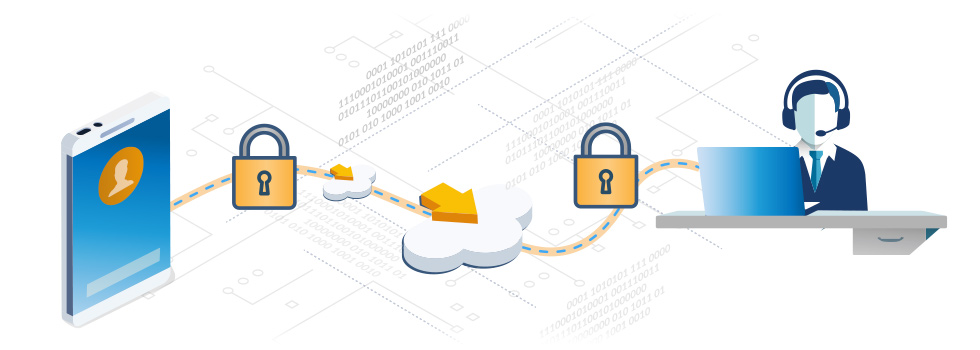Voice over IP security is something you must pay close attention to. In this detailed guide, we will cover everything that you need to know about voice over IP security and encryption.
- Are VoIP Calls Secure?
- Voice Over IP Vulnerabilities
- How to Recognize a VoIP Attack
- Voice Over IP Versus PSTN
- How to Protect Your VoIP System
- 12 Best Practices for a Secure VoIP System
- VoIP Encryption Methods
Are VoIP Calls Secure?
While voice over IP is fairly secure, there is still a possibility that hackers may target and compromise your VoIP system. To avoid such security breaches, VoIP security should be taken seriously and steps must be taken to ensure a secure VoIP phone system.
The 6 Most Common Vulnerabilities of Your Voice Over IP System
In order to best secure your VoIP numbers against hackers, you must be aware of the different VoIP security vulnerabilities and types of attacks possible. Here are the top Voice over IP security vulnerabilities to be aware of:
1. Default security settings
VoIP credentials need to be configured accurately. Your web phone is essentially a smartphone that has computer-like capabilities. Instead of using default settings and passwords, users should configure secure credentials to avoid vulnerabilities.
2. Using VoIP over WiFi
Using shared WiFi or networks can often cause security breaches. And since VoIP systems need an internet source — mostly WiFi — to work effectively, there is a chance of the security being compromised when using a public or shared WiFi connection instead of a secure office connection.
3. Attacks on the network
Similar to the WiFi being hacked, one’s user network can also be disrupted and breached. There are various types of network attacks. Attacks on one’s business phone network can directly impact their VoIP security.
4. Remote eavesdropping
In most cases, when your system is vulnerable or attacked, hackers have the ability to eavesdrop on confidential and private information. This information can then be used against your company, either via blackmail or by selling it to the competition.
5. Viruses infecting the system
The internet can be easily invaded by viruses and malware. Any internet application and device associated with it is therefore prone to viruses and security breaches. And since VoIP uses the internet, it too remains vulnerable to such attacks.
6. VoIP phishing
Phishing, also referred to as vishing, is a concept similar to catfishing. With VoIP phishing, when a call is made, the caller pretends to be from a credible organization and inquires about private or sensitive information. These callers often perform VoIP phishing by gaining information about you and your company which makes them appear as legitimate and credible. This creates a false sense of security which may result in sensitive information being shared.
How to Recognize a VoIP Attack
So, how do you know if your VoIP phone system has been attacked? Here are a few key indicators of a VoIP security breach:
1. Huge monthly bills
Has your monthly VoIP bill increased dramatically and unexpectedly? If so, there’s a good chance that your VoIP system has been attacked. Hackers are able to make a call’s IP similar to one recognized by your system. This allows them to use your VoIP infrastructure to make multiple calls without being charged.
2. Suspicious call history
Similar to the above issue, if your call history is irregular and doesn’t fit the number of calls your business is making, it is likely that a hacker is using your system to make calls. To combat this, keep tabs on your call history, check it regularly, and make note of unrecognized call patterns and disparities.
3. Redirected internet searches
If a search through your VoIP system has been redirected to an unknown or unwanted page or website, then it is a sign of your internet system being hacked. Always remember to log out of the system when users are done.
Is Voice Over IP More Secure Than PSTN?
VoIP can be more secure than PSTN depending on the measures your business and your VoIP provider take to protect it. This leads us to the next section that details various methods to increase VoIP security for your business phone system.

How to Protect Your VoIP System
There are various policies that businesses can implement to have a secure VoIP system. Encrypting voice traffic and running regular security checks are the best ways to protect your VoIP calls. Let’s look at the top best practices for voice over IP security:
12 Best Practices to Secure Your VoIP System
1. Encrypt voice traffic
Voice encryption is of utmost importance. Encrypt voice traffic and other traffic that moves through your VoIP system using encryption techniques.
2. Encrypt WiFi
Besides encrypting your voice traffic, you should also encrypt your WiFi providing it with maximum security from breaches.
3. Use a VPN
A virtual private network or VPN adds an additional layer of security. A VPN protects calls occurring over mobile or wireless networks and is a good solution to keep your system secure for on-site as well as off-site workers.
4. Strong passwords
This goes without saying. Make an effort to understand your security system, change default security settings, use strong passwords, and change passwords regularly.
5. Run regular security checks
Conduct regular security checks to test your system and see how it responds and how your security measures perform. Look for backdoors, vulnerabilities, or traces of past hacks. You can also consider implementing CSPM tools, which provide continuous monitoring of your cloud-based VoIP infrastructure. These tools can help detect misconfigurations or vulnerabilities in real-time, allowing you to address potential threats before they escalate.
6. Enable Network Address Translation (NAT)
Network address translation (NAT) is a router feature. This feature gives your VoIP system and devices associated with it a private IP address that is only visible on your LAN. It, therefore, acts as a wall between your system and the internet, making it difficult for outsiders to view your IP address. If they can’t view the IP address, then they can’t use it to hack your system.
7. Close Port 80 With a Firewall
VoIP devices — especially phones — on a local access network need ports to connect to the internet. A port is an active channel located on a router. Port 80 or the Hypertext Transfer Protocol is a port on the router that has HTTP traffic. HTTP traffic is the kind that is used on most websites. This is why port 80 is prone to easy hacking. Use a firewall to close your port 80 so that hackers can’t use it to access the web interface.
8. Keep systems and software up-to-date
Whether it is the computers’ operating systems or anti-virus software, keeping these systems and software up-to-date is crucial to security and protection. You may even consider using an intrusion prevention system or VoIP firewall to add additional layers of security.
9. Avoid international calling, unless needed
Unless your company works in international business and calling internationally is crucial to its operations, it is a good practice to disable international calling. However, if your business needs to call internationally, then make sure to check call records and history often to ensure there are no irregularities.
10. Consider remote device management
Remote device management enables remote access to a device which can then be wiped if the employee quits or is fired, or if the device is stolen. Whether your business issues laptops or implements a remote device management policy, ensure you activate remote device management on devices used by employees.
11. Educate users about VoIP security
It is important that all users of your VoIP phone system understand how the system works and how to keep it secure. Take time out to educate your employees about VoIP security and best practices.
12. See something, say something
By educating employees about VoIP security, you can train them to observe and notice irregularities or suspicious activity which they can then report to you. Such suspicious activity should then be brought to the notice of your VoIP provider.
Most Common VoIP Encryption Methods
In order to encrypt your VoIP traffic, you need to first understand how VoIP and SIP work together. SIP technology or Session Initiation Protocol in a VoIP phone system begins and ends a call session. SIP vulnerability occurs when a hacker invades the SIP process and uses it to eavesdrop on the call, collect sensitive information, and more. To secure your VoIP system, you must first secure your SIP transmission. Here are some VoIP encryption methods to consider:
- Transport Layer Security (TLS)
Typically, this type of security is used to encrypt a VoIP SIP system when sessions begin and end. TLS keeps your VoIP secure by authenticating a security certificate and encrypting the information transmitted between two or more parties.
- Secure Real-Time Transport Protocol (SRTP)
Typically, this type of security is used for high bandwidth VoIP usage. For example, you can use SRTP to secure voice calls and avoid bad or low call quality. SRTP protects voice data and information during the call by encrypting the call and adding message authentication within the channel.
- Physical Protection
Lastly, you want to protect your company’s data from unhappy employees and other users who may have physical access to your VoIP system and hardware. The best way to avoid privacy and security breaches, such as the ones mentioned above, is to limit access to your system and enable remote device management.
Learn More About How to Secure Your VoIP System
Enabling VoIP security is essential to ensuring high-quality and fraud-free voice calling. This will help you offer secure services to your clients and keep their data safe. And doing so goes a long way in building strong customer relationships and credibility. Learn more about United World Telecom’s VoIP systems for business by speaking with our experts today!
